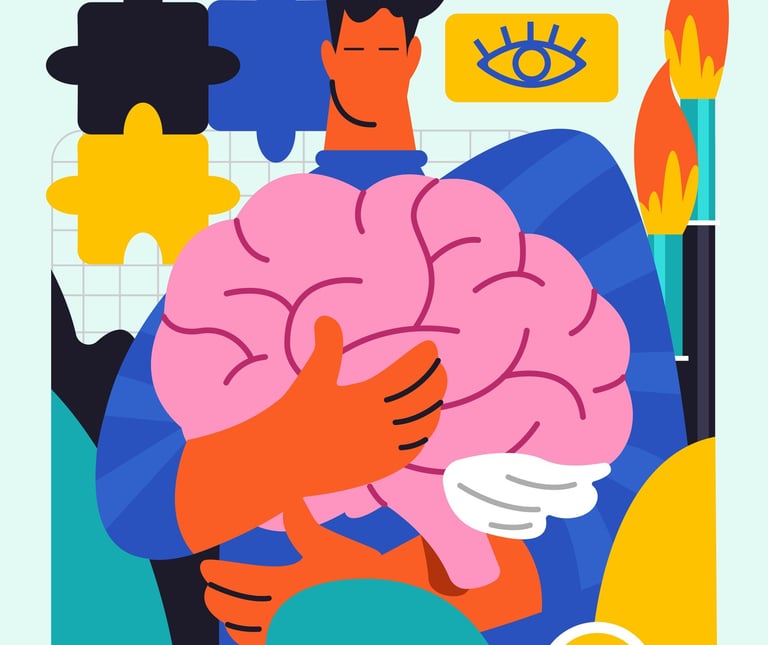"Mann Ko Byatha" is Real: Validating Emotional Pain in Nepali Culture
Explore the concept of "Mann Ko Byatha" in Nepal. Learn why this emotional pain is a real mental health concern and how to seek validation and support in a cultural context.
MENTAL HEALTH IN NEPAL
MANOSANSAR
3/5/20253 min read


In Nepal, we have a phrase for that deep, aching sorrow that has no visible wound "Mann Ko Byatha." Literally translating to "the heart's sorrow," this term is a cultural window into the Nepali experience of emotional suffering for generations, whispered in conversations, a shared acknowledgment of inner turmoil.
Yet, too often, "Mann Ko Byatha" is dismissed as a temporary sadness, something to be hidden away with a brave face. This dismissal exacerbates the profound stigma in Nepal surrounding psychological distress. It's time to affirm what many intuitively know: Mann Ko Byatha is real. It is a valid experience of emotional pain and a crucial aspect of Nepali mental health that deserves recognition, understanding, and care. It is not a clinical diagnosis, but a cultural expression of distress that manifests a deep, persistent feeling of heaviness or emptiness, overwhelming worry and anxiety that disrupts daily life and the psychological anguish following loss, trauma, or betrayal
In the context of mental health in Nepal, recognizing "Mann Ko Byatha" as more than just a passing phase is the first step toward validation. It is the body's and mind's way of signaling that something is wrong.
The Cultural Crossroad: Stigma and Silence
The profound challenge embedded within the concept of "Mann Ko Byatha" exists at a complex cultural crossroad, where deep-seated cultural norms intersect with pervasive stigma to create a silencing effect on mental health of individuals. Because this type of suffering lacks a visible, physical wound, it is frequently met with responses that, while often well-intentioned, are profoundly harmful and invalidating.
When someone is told, “Dherai nasocha” (Don’t overthink), their internal reality is dismissed, implicitly framing their intense emotional pain as a voluntary act of indulgence rather than a legitimate health experience. Similarly, the common tactic of comparison, such as being urged to “look at others who have it worse,” minimizes individual suffering by placing it on a false hierarchy, making the person feel guilty for their own distress.
Furthermore, spiritual bypassing, attributing the pain solely to past karma (bhagya) or a lack of faith, shuts down the conversation by redirecting it to a metaphysical plane, effectively avoiding the necessary human compassion and psychological support needed in the present moment. This trifecta of cultural invalidation creates an environment where expressing such pain is deemed unacceptable, forcing individuals to suppress their authentic emotions. This enforced silence doesn't eliminate the suffering; instead, it compounds it, leading to a worsening of symptoms and a deep, isolating belief that their anguish is a personal failure rather than a universal human experience that deserves acknowledgment and care.
From Validation to Healing: Honoring the Pain
To change the narrative around Nepali mental health, we must move from dismissal to validation. Here’s how we can start to honor "Mann Ko Byatha":
1. Validate Your Own Experience: If you are feeling this pain, your first act of courage is to acknowledge it without judgment. Tell yourself, "What I am feeling is real and valid. I am not weak for hurting." This self-compassion is the foundation of healing.
2. Validate Others: If someone confides in you, avoid quick fixes. Instead, use validating languages "Timi sanga yehi feel bhayo bhanera malai dherai dukha lagyo." (I am sorry you are going through this.) "Yo sunera malai dukha lagyo. Timilai kei sahayog garna sakchhu ki?" (It hurts to hear this. How can I support you?)
Simply saying, "Ma timro byatha bujhchhu" (I understand your pain) can be incredibly powerful.
3. Seek Professional Support: "Mann Ko Byatha" can be a sign of underlying mental health conditions like depression or anxiety disorders. Seeking help is a sign of strength. Talk to a professionals, as counselors and therapists are trained to help you navigate this pain and develop healthy coping mechanisms.
Reach out to helplines: They provide a confidential, non-judgmental space to be heard.
Resources for Support:
KOSHISH National Mental Health Helpline: 1660 01 2004
TPO Nepal Counselling Helpline: 1660 01 2005
Conclusion: Turning the Light On
"Mann Ko Byatha" is not a flaw in the Nepali spirit; it is a testament to our capacity to feel deeply. By giving a name to this pain, our culture has already taken the first step. Now, we must take the next one: treating it with the seriousness and compassion it deserves.
Let’s move beyond the silence. Let’s validate the pain, honor the struggle, and build a Nepal where no one has to suffer from "Mann Ko Byatha" alone. By talking openly, we don't just reduce stigma in Nepal; we build a more compassionate and resilient society.
References and Citations
TPO Nepal. (n.d.). Understanding Mental Health in the Nepali Context. Retrieved from https://tpnepal.org.np/
KOSHISH. (n.d.). Breaking the Stigma. Retrieved from http://www.koshishnepal.org/
World Health Organization (WHO). (2017). Mental Health Atlas 2017 - Country Profile: Nepal. Retrieved from https://www.who.int/mental_health/evidence/atlas/profiles-2017/NPL.pdf
Kohrt, B. A., & Hruschka, D. J. (2010). Nepali concepts of psychological trauma: the role of idioms of distress, ethnopsychology and ethnophysiology in alleviating suffering and preventing stigma. Culture, Medicine, and Psychiatry, 34(2), 322–352. https://doi.org/10.1007/s11013-010-9170-2
contact@manosansar.com
© 2025. All rights reserved by MANOSANSAR NEPAL.
📄 Quick Links:
🔹 About Us
🔹 Our Programs
🔹 Get Involved
🔹 Donate
🔹 Contact Us
🔒 Privacy Policy | 📜 Terms of Service
